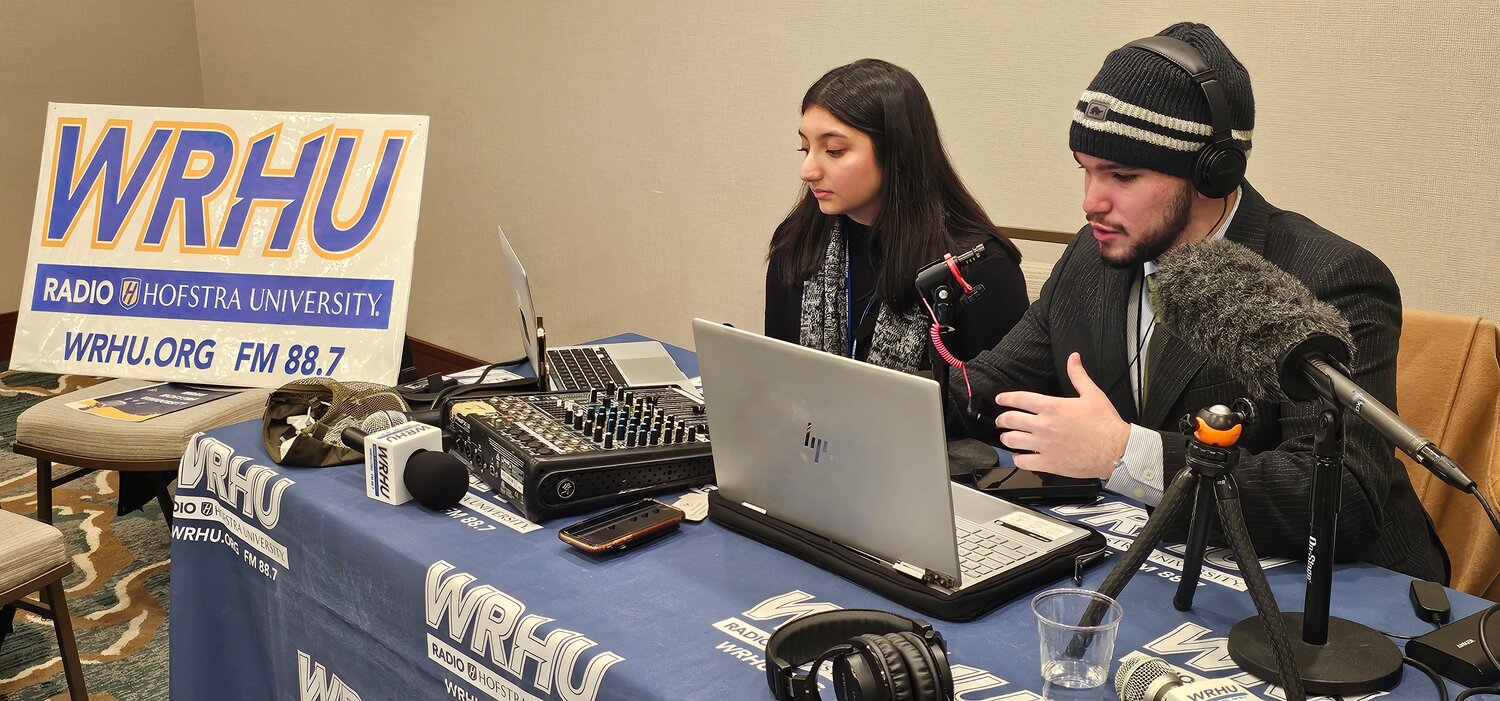Taking a dive into political reporting
Against the backdrop of a media frenzy at the New Hampshire primary, student journalists from WRHU-FM, Hofstra University’s radio station, embarked on an enlightening journey into the world of political reporting. For students like Glen Cove resident Joseph Pergola, a junior at the university, the primary was more than just a chance to hone his craft — it was a gateway to understanding the intricate interplay among politics, media and public opinion.
Armed with cameras, microphones and journalistic curiosity, Pergola and other students worked polling sites and political hot spots, capturing stories that they hoped would resonate with the WRHU audience. Pergola scored an interview with Republican presidential hopeful Nikki Haley, but his focus remained on Generation Z’s perspective on the crucial 2024 election. He spoke with University of New Hampshire students on the Durham campus, as well as the members of the Party for Socialism and Liberation.
“What they told us was that (the primary) was distracting from the Middle East tragedy that’s going on, and that’s really what people should be focused on,” Pergola recalled from his interviews. “So that was a very interesting perspective that I wasn’t really planning to hear while I was up there. I figured that a lot of people in New Hampshire would really be focused on that primary. That really caught me off guard.”
The itinerary of the four-day trip was designed to immerse the students in the political process and give them ample opportunities for reporting, and networking with professional journalists. Mornings, afternoons and evenings were dedicated to covering campaign events, rallies and candidate speeches across the state.
“We want students to understand that journalism isn’t just about reporting — it’s about hard work,” John Mullen, general manager of WRHU-FM, said. “The trip to New Hampshire exposes them to the realities of the field, from chasing down interviews to editing sound bites. At Hofstra and WRHU, it’s about bridging classroom knowledge with real-world application.”
As expected, the student journalists faced challenges ranging from battling the bitter cold to grappling with the intricacies of “audio collection,” the trials and tribulations of field reporting. But with each obstacle came a lesson — a chance to grow, adapt and refine their skills. Along with their own instincts, they relied on seasoned journalists, asking them, for example, where the best spots for interviews were.
“It can be intimidating at times, and a little uncomfortable,” Pergola said, recalling his discussions with reporters from other media outlets. “I talked to somebody Tuesday morning — he told me what the most popular voting place was. If I hadn’t done that, I wouldn’t have gotten all the great sound bites and the great interviews. I wouldn’t have been able to see Nikki Haley.”
Doualy Xaykaothao, one of the university’s professional journalists in residence and a veteran reporter for National Public Radio, accompanied the students on the trip. She not only offered guidance on the factual and ethical standards of reporting, but also emphasized the importance of being prepared to conduct interviews in the field, sometimes amid harsh weather conditions, while finding the ideal sound bites for news packages.
Xaykaothao noted that students had to learn to “read the space” and weigh their safety along with their ability to gather sound, a lesson that was new to many of them.
“In radio you’ve got to know how to collect audio — you’ve got to grab that natural sound, she explained. “You’re taking people to a location, you’re introducing listeners to people walking somewhere, or people protesting somewhere, or the sound of a diner, the sound of a road. That’s all part of storytelling in radio.”
Pergola described his experience as overwhelmingly positive, adding that witnessing the political process firsthand helped him feel the energy and passion of candidates and voters alike, and understand the significance of his role in shaping the narrative.
“My biggest takeaway was definitely to network and talk to people to try to gather as much information you can, especially if you’re struggling with leads,” Pergola said. “Definitely talk to all kinds of people, because you never know what you’re going to find out.”

 44.0°,
Mostly Cloudy
44.0°,
Mostly Cloudy 




